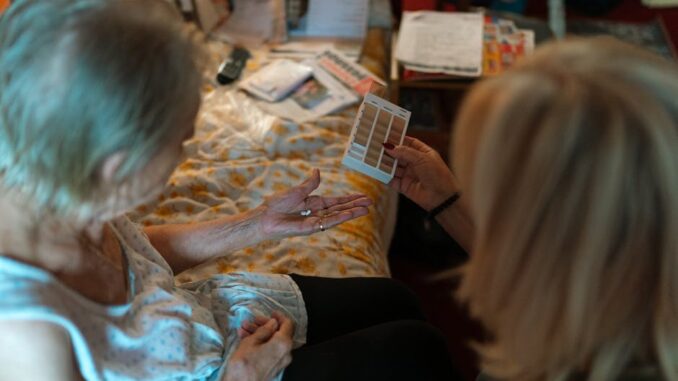
Summary
ChristianaCare’s Swank Center for Memory Care will pilot the groundbreaking GUIDE Model, offering comprehensive support for dementia patients and their caregivers. This program includes personalized care plans, 24/7 support, respite services, and caregiver training. Set to launch in July 2025, GUIDE aims to improve dementia patients’ quality of life and reduce caregiver strain.
** Main Story**
Dementia Care Gets a Makeover: Swank Center’s Pioneering Project
ChristianaCare’s Swank Center for Memory Care is stepping up its game, spearheading a real shift in how we approach dementia care. The Centers for Medicare & Medicaid Services (CMS) handpicked the Swank Center to pilot the Guiding an Improved Dementia Experience (GUIDE) Model, and I think it’s a pretty big deal. This program? It’s all about a holistic, person-first approach, making sure both the individuals living with dementia and their caregivers get the support they desperately need.
With a launch date set for July 2025, the main goal is to make life better for dementia patients while lightening the load for their caregivers. It’s ambitious, sure, but definitely needed.
What’s the GUIDE Model All About?
The GUIDE Model is a game-changer in Medicare’s approach to dementia. It dives headfirst into the complex challenges dementia presents, offering a full suite of services, including:
- Customized Assessments and Care Plans: Dementia’s a personal journey, right? So, GUIDE starts with a deep dive assessment to create a care plan tailored to each person’s specific needs and goals. It’s not a one-size-fits-all deal. I was speaking to a friend the other day, and he was talking about the importance of getting care plans tailored to the individual.
- Care Coordination is Key: A dedicated care navigator will help patients and families navigate the often confusing healthcare system, connecting them with medical and non-medical services. Think help with meals, transportation, all that stuff. This can cut down on so much stress, you wouldn’t believe it. It can also help prevent social isolation, which as we know can negatively affect one’s physical and mental health.
-
24/7 Support and Respite: Dementia care doesn’t clock out at 5 PM, and neither does GUIDE. There’s a round-the-clock support line manned by a whole team of experts. And, crucially, they offer respite services, giving caregivers a much-needed break. Because let’s face it, being a caregiver is tough.
-
Training and Education: Knowledge is power, and GUIDE equips caregivers with the know-how they need to provide the best possible care. Education programs cover best practices for dementia care, giving caregivers the tools to really support their loved ones. Did you know that some studies suggest that caregiver education actually decreases the likelihood of certain patient related emergencies?
Swank Center: Setting the Standard
The Swank Center’s selection as a GUIDE pilot site just confirms what many already know: they’re leaders in memory care. With locations across Delaware, the Swank Center serves patients and caregivers throughout the region. Their team of specialists – geriatrics, geriatric psychiatry, neurology – work together to provide thorough assessments, diagnoses, and treatment. And their involvement with GUIDE just reinforces their commitment to innovative, patient-centered care. Dr. Steven Huege, The Swank Foundation Endowed Chair in Memory Care and Geriatrics at ChristianaCare, seems pretty excited about GUIDE, and I can see why. It has the potential to really change how dementia care is delivered and make it more accessible.
Why This Matters – A Growing Crisis
The GUIDE Model couldn’t have come at a better time. The number of Americans living with dementia is going up, and that’s putting a strain on families and healthcare systems. Over 22,000 people aged 65 and older in Delaware alone are living with Alzheimer’s. And get this – around 31,000 Delawareans are family caregivers for those with Alzheimer’s. It’s staggering. GUIDE is a proactive attempt to tackle this issue, offering a care model that’s both effective and, hopefully, sustainable. Chiquita Brooks-LaSure, the CMS Administrator, gets it. She emphasizes GUIDE’s potential to ease the strain on caregivers and allow more Americans with dementia to stay in their homes and communities. What’s not to like?
Looking Ahead: A Brighter Future?
Honestly, the GUIDE Model offers real hope for the future of dementia care. By supporting both patients and caregivers, it aims to improve lives, cut healthcare costs, and lighten the burden on families. As the Swank Center gears up to launch GUIDE in July 2025, they’re embarking on a journey that could transform how we care for those living with dementia and those who care for them. While this information reflects the current status as of today, April 2, 2025, it’s worth remembering that details may shift as the pilot unfolds. And that’s okay. Progress isn’t always a straight line, is it? It’s a process. And I’m here for it.


The GUIDE model’s focus on personalized care plans is commendable. How will the program ensure these plans remain dynamic and adaptable as a patient’s condition evolves, especially considering the progressive nature of dementia?
That’s a crucial point! The GUIDE model incorporates regular reassessments and feedback loops with the care team, patient, and family. This ensures the plan is continuously adjusted to reflect the patient’s evolving needs and circumstances. It’s all about proactive adaptation! Thanks for raising this important question.
Editor: MedTechNews.Uk
Thank you to our Sponsor Esdebe